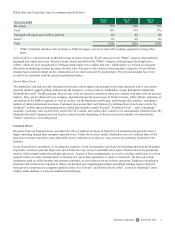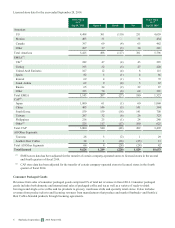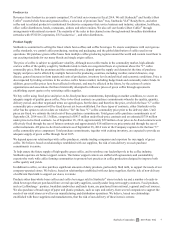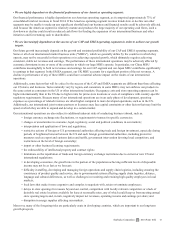Starbucks 2014 Annual Report Download - page 19
Download and view the complete annual report
Please find page 19 of the 2014 Starbucks annual report below. You can navigate through the pages in the report by either clicking on the pages listed below, or by using the keyword search tool below to find specific information within the annual report.
Starbucks Corporation 2014 Form 10-K 15
•
e purchase, roast, and sell high-quality whole bean coffee beans and related coffee products. The price of coffee is
subject to significant volatility and has and may again increase significantly due to one or more of the factors described below.
The high-quality coffee of the quality we seek tends to trade on a negotiated basis at a premium above the "C" price.
This premium depends upon the supply and demand at the time of purchase and the amount of the premium can vary
significantly. Increases in the "C" coffee commodity price do increase the price of high-quality coffee and also impact
our ability to enter into fixed-price purchase commitments. e frequently enter into supply contracts whereby the quality,
quantity, delivery period, and other negotiated terms are agreed upon, but the date, and therefore price, at which the base "C"
coffee commodity price component will be fixed has not yet been established. These are known as price-to-be-fixed contracts.
The supply and price of coffee we purchase can also be affected by multiple factors in the producing countries, including
weather, natural disasters, crop disease, general increase in farm inputs and costs of production, inventory levels and political
and economic conditions, as well as the actions of certain organizations and associations that have historically attempted to
influence prices of green coffee through agreements establishing export quotas or by restricting coffee supplies. Speculative
trading in coffee commodities can also influence coffee prices. Because of the significance of coffee beans to our operations,
combined with our ability to only partially mitigate future price risk through purchasing practices and hedging activities,
increases in the cost of high-quality coffee beans could have an adverse impact on our profitability. In addition, if we
are not able to purchase sufficient quantities of green coffee due to any of the above factors or to a worldwide or regional
shortage, we may not be able to fulfill the demand for our coffee, which could have an adverse impact on our profitability.
e also purchase significant amounts of dairy products, particularly fluid milk, to support the needs of our company-operated
retail stores. Additionally, and although less significant to our operations than coffee or dairy, other commodities, including but
not limited to tea and those related to food inputs, such as cocoa, produce, baking ingredients, meats and energy, are important
to our operations. Increases in the cost of dairy products and other commodities, or lack of availability, especially in
international markets, could have an adverse impact on our profitability.
•
Our operating results have been in the past and will continue to be subject to a number of factors, many of which are largely
outside our control. Any one or more of the factors listed below or described elsewhere in this risk factors section could
adversely impact our business, financial condition and/or results of operations:
• increases in labor costs such as increased health care costs, general market and minimum wage levels and workers'
compensation insurance costs;
• adverse outcomes of litigation; and
• especially in our larger or fast growing markets, labor discord, war, terrorism (including incidents targeting us),
political instability, boycotts, social unrest, and natural disasters, including health pandemics that lead to avoidance of
public places or restrictions on public gatherings such as in our stores.
•
Any material interruption in our supply chain, such as material interruption of roasted coffee supply due to the casualty loss of
any of our roasting plants, interruptions in service by our third party logistic service providers or common carriers that ship
goods within our distribution channels, trade restrictions, such as increased tariffs or quotas, embargoes or customs restrictions,
or natural disasters that cause a material disruption in our supply chain could negatively impact our business and our
profitability.
Additionally, our food, beverage and other products are sourced from a wide variety of domestic and international business
partners in our supply chain operations, and in certain cases are produced or sourced by our licensees directly. e rely on these
suppliers and vendors to provide high quality products and to comply with applicable laws. Our ability to find qualified
suppliers and vendors who meet our standards and supply products in a timely and efficient manner is a significant challenge,
especially with respect to goods sourced from outside the US. vendor's or supplier's failure to meet our standards, provide
products in a timely and efficient manner, and comply with applicable laws is beyond our control. These issues could
negatively impact our business and profitability.
• Failure to meet market expectations for our financial performance will likely adversely affect the market price and
volatility of our stock.
Failure to meet market expectations going forward, particularly with respect to operating margins, earnings per share,
comparable store sales, operating cash flows, and net revenues, will likely result in a decline and/or increased volatility in the
market price of our stock. In addition, price and volume fluctuations in the stock market as a whole may affect the market price
of our stock in ways that may be unrelated to our financial performance.
• The loss of key personnel or difficulties recruiting and retaining qualified personnel could adversely impact our business
and financial results.
Much of our future success depends on the continued availability and service of senior management personnel. The loss of any
of our executive officers or other key senior management personnel could harm our business. We must continue to recruit,
retain and motivate management and other employees sufficiently, both to maintain our current business and to execute our
strategic initiatives, some of which involve ongoing expansion in business channels outside of our traditional company-
operated store model. Our success also depends substantially on the contributions and abilities of our retail store employees
whom we rely on to give customers a superior in-store experience. Accordingly, our performance depends on our ability to
recruit and retain high quality employees to work in and manage our stores, both domestically and internationally. If we are
unable to recruit, retain and motivate employees sufficiently to maintain our current business and support our projected growth,
our business and financial performance may be adversely affected.
• We rely heavily on information technology in our operations, and any material failure, inadequacy, interruption or security
failure of that technology could harm our ability to effectively operate our business and could adversely affect our
financial results.
We rely heavily on information technology systems across our operations, including for administrative functions, point-of-sale
processing and payment in our stores and online, management of our supply chain, Starbucks Cards, online business, mobile
payments, reloads and loyalty functionality and various other processes and transactions. Our ability to effectively manage our
business and coordinate the production, distribution and sale of our products depends significantly on the reliability, integrity
and capacity of these systems. We also rely on third party providers and platforms for some of these information technology
systems and support. Although we have security measures in place, they may not be effective in preventing the failure of these
systems or platforms to operate effectively and be available. Such failures may be caused by various factors, including power
outages, catastrophic events, problems with transitioning to upgraded or replacement systems or platforms, flaws in third party
software, or a breach in the security of these systems or platforms, including through cyber-attacks. If our disaster recovery and
business continuity plans do not resolve these issues in an effective manner they could cause material negative impacts to our
product availability and sales, the efficiency of our operations and our financial results.
• Failure to comply with applicable laws and regulations could harm our business and financial results.
Our policies and procedures are designed to comply with all applicable laws, accounting and reporting requirements, tax rules
and other regulations and requirements, including those imposed by the SEC, NASDAQ, and foreign countries, as well as
applicable trade, labor, healthcare, privacy, food, anti-bribery and corruption and merchandise laws. The complexity of the
regulatory environment in which we operate and the related cost of compliance are both increasing due to additional or
changing legal and regulatory requirements, our ongoing expansion into new markets and new channels, and the fact that
foreign laws occasionally conflict with domestic laws. In addition to potential damage to our reputation and brand, failure to
comply with the various laws and regulations, as well as changes in laws and regulations or the manner in which they are
interpreted or applied, may result in litigation, civil and criminal liability, damages, fines and penalties, increased cost of
regulatory compliance and restatements of our financial statements.
Item 1B. Unresolved Staff Comments
None.
























